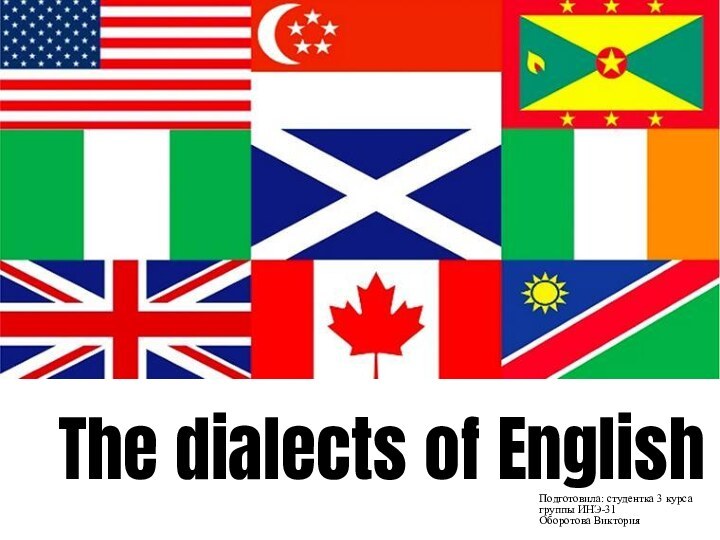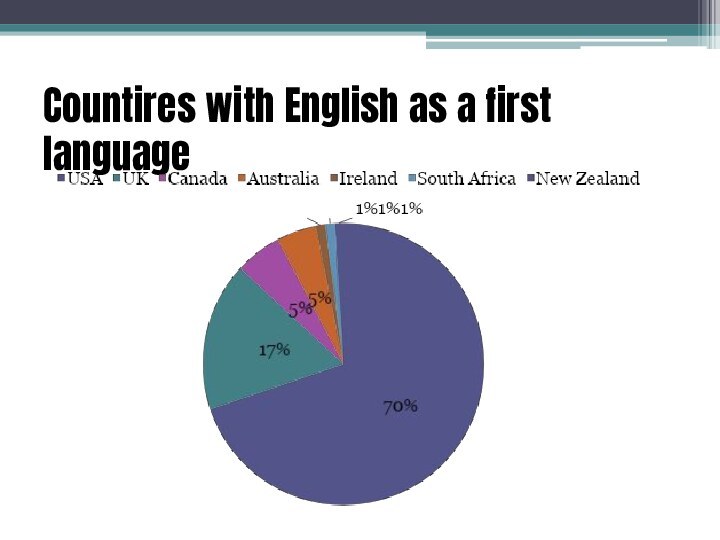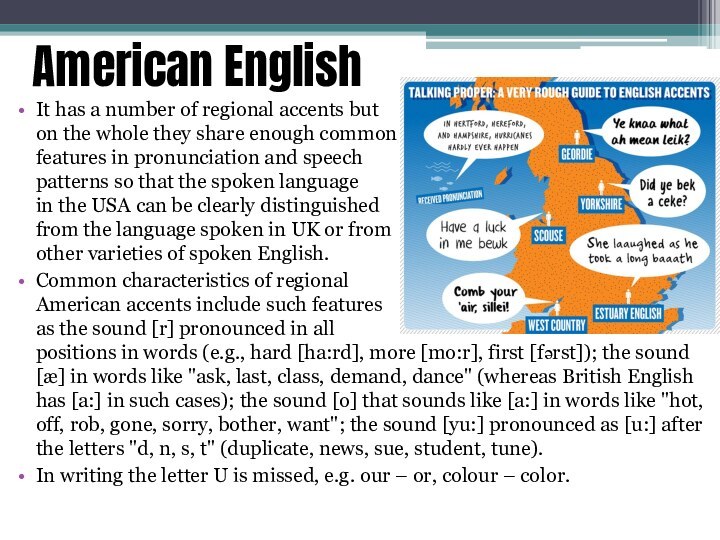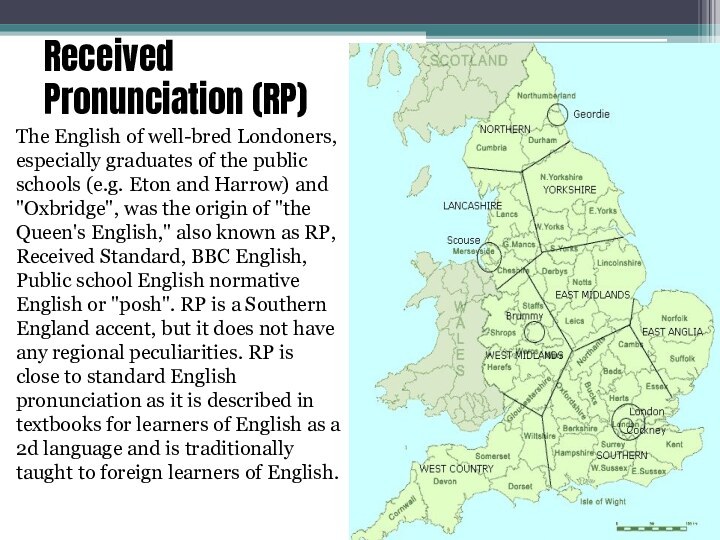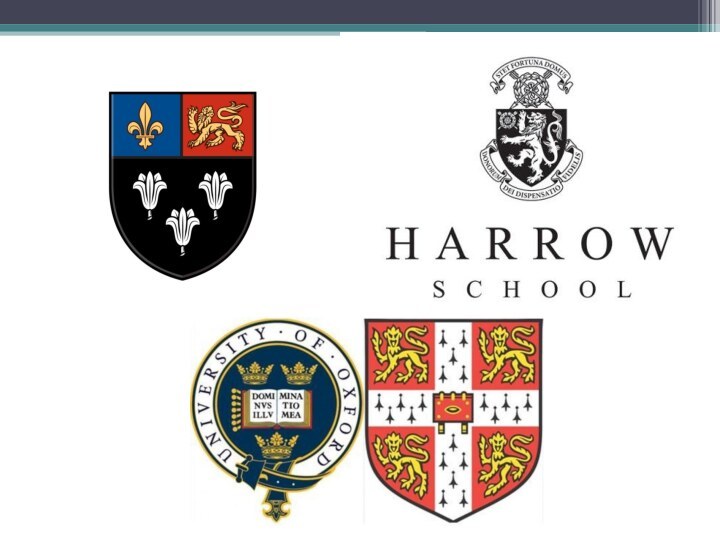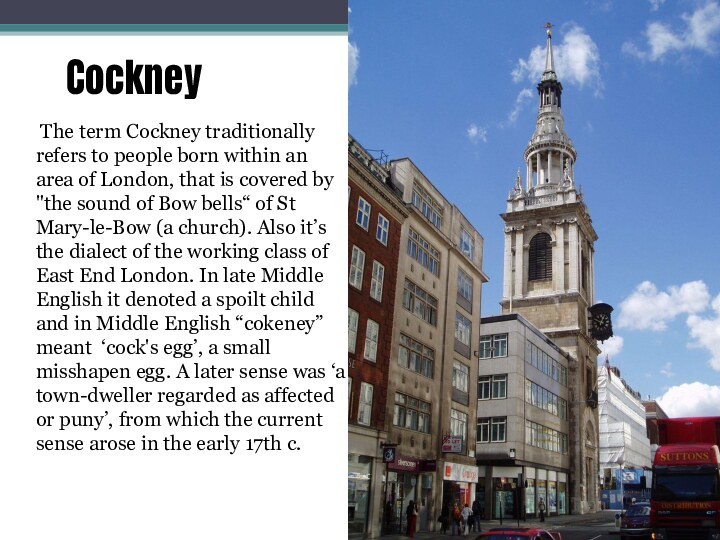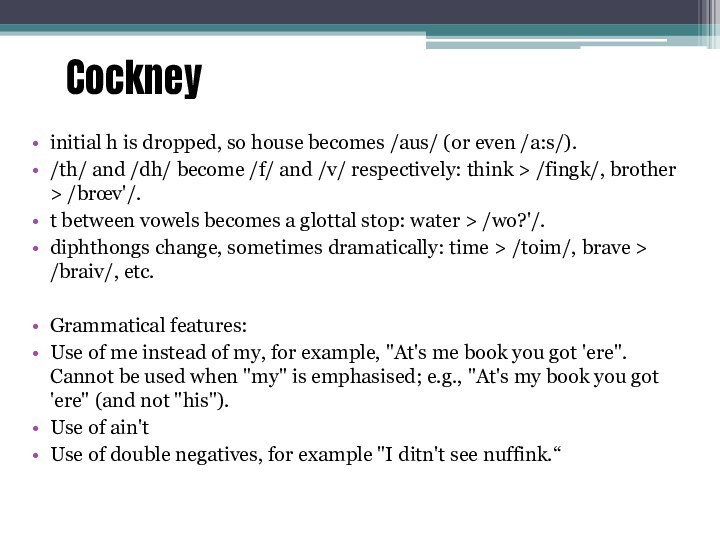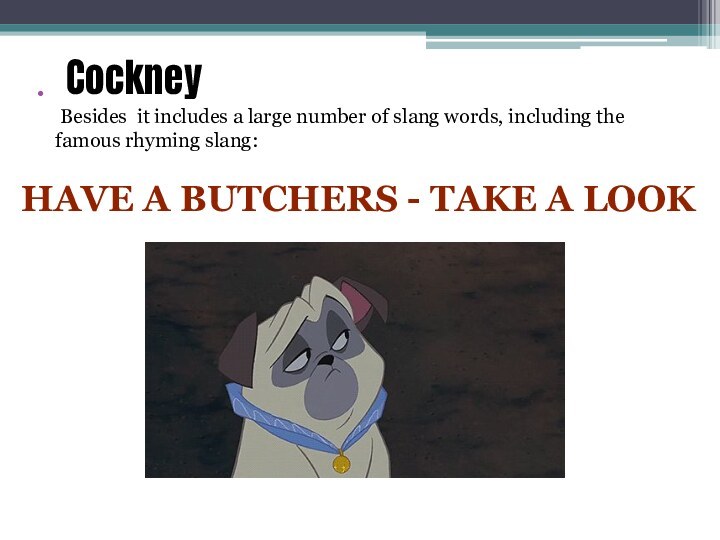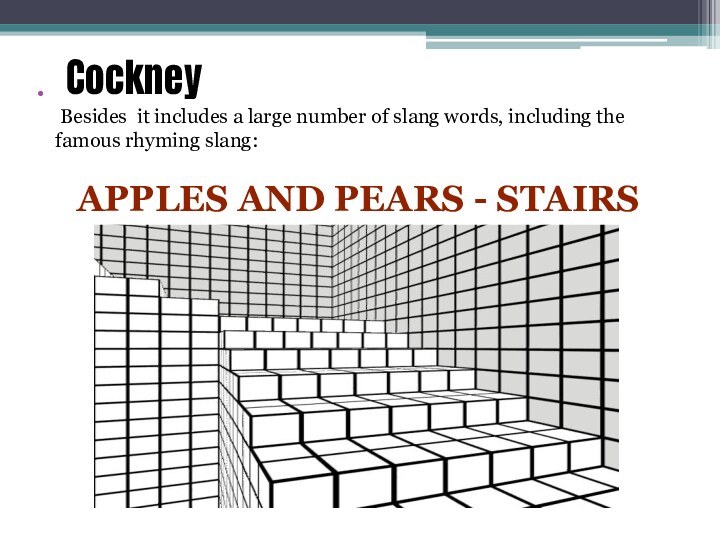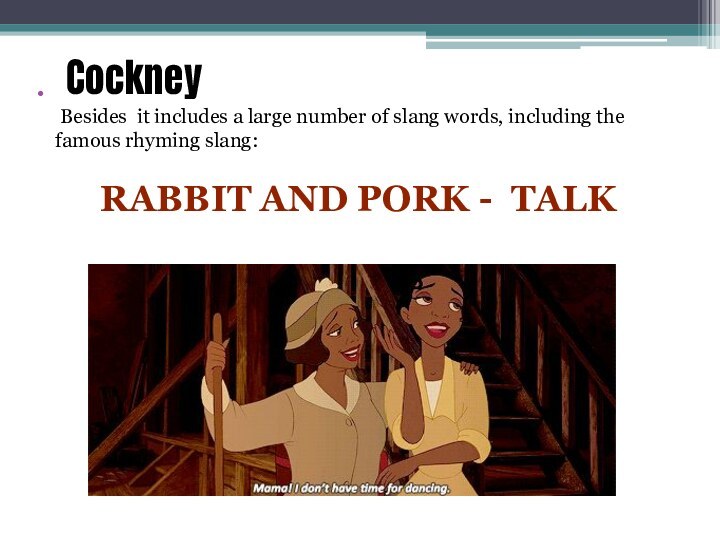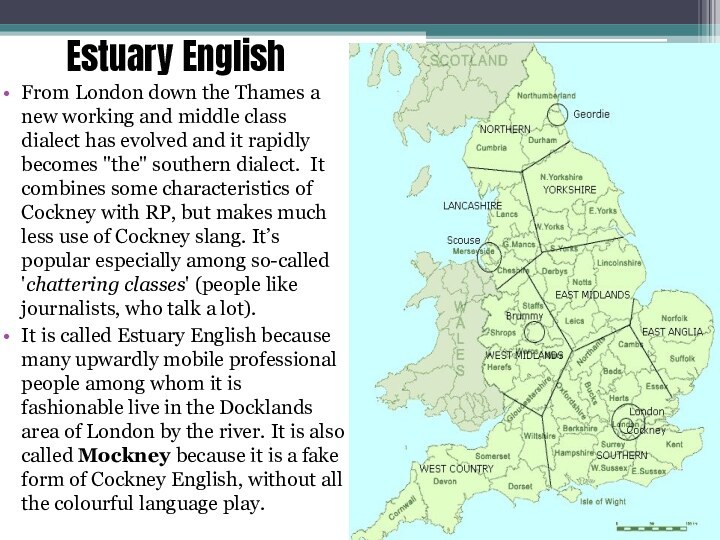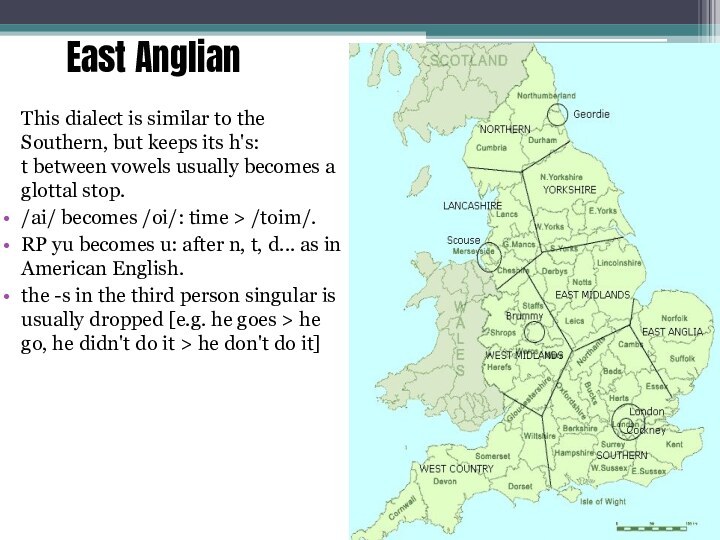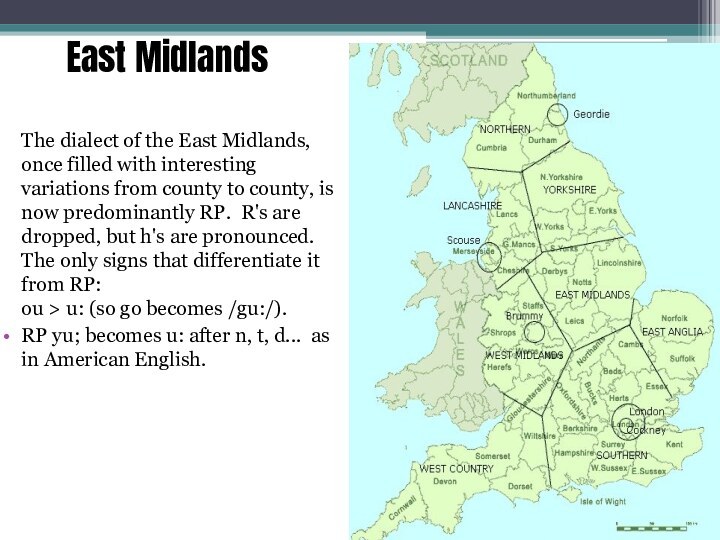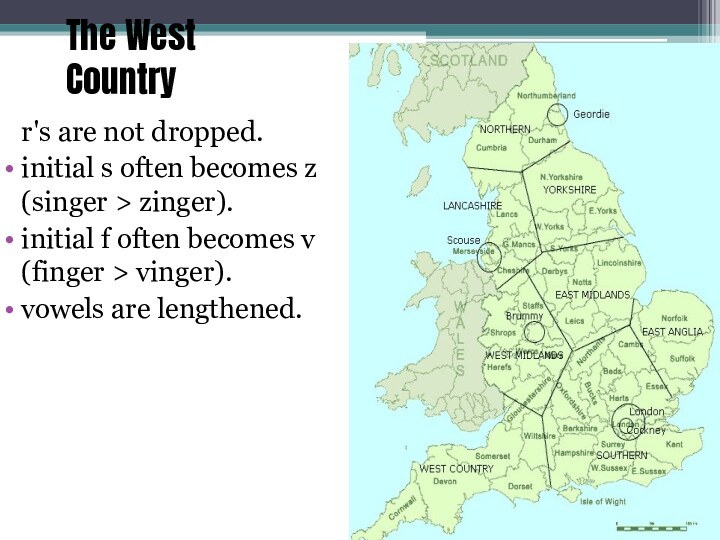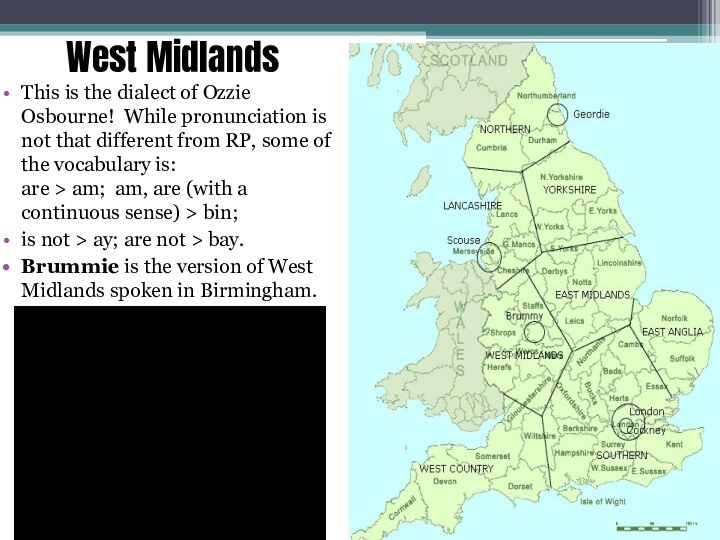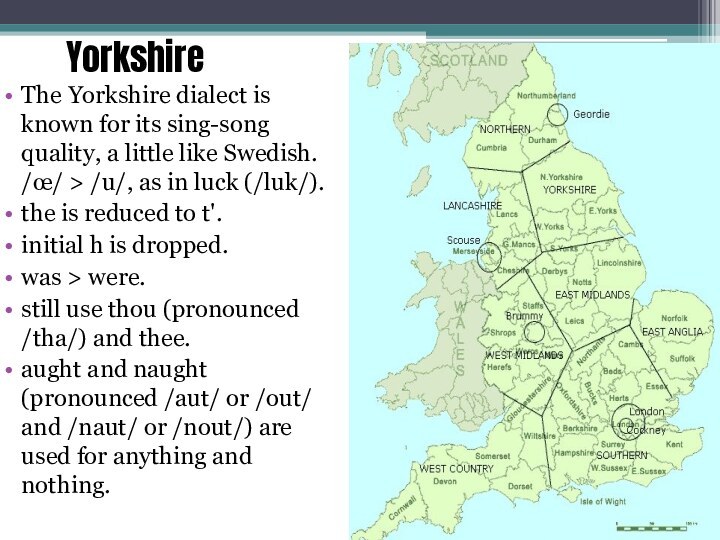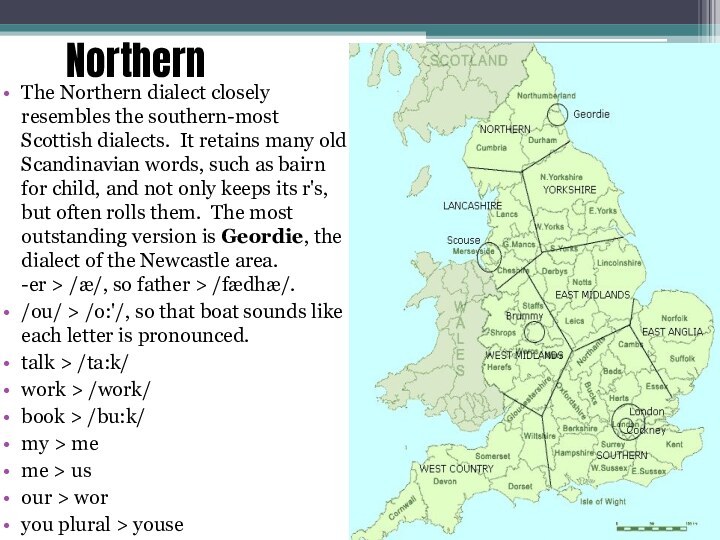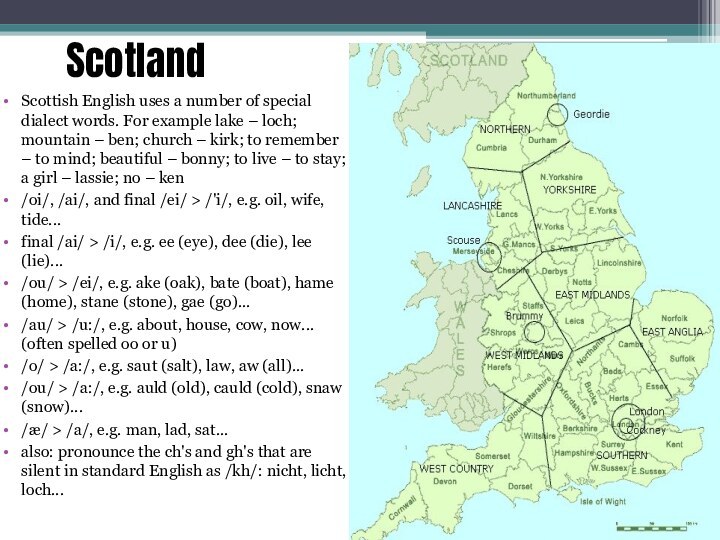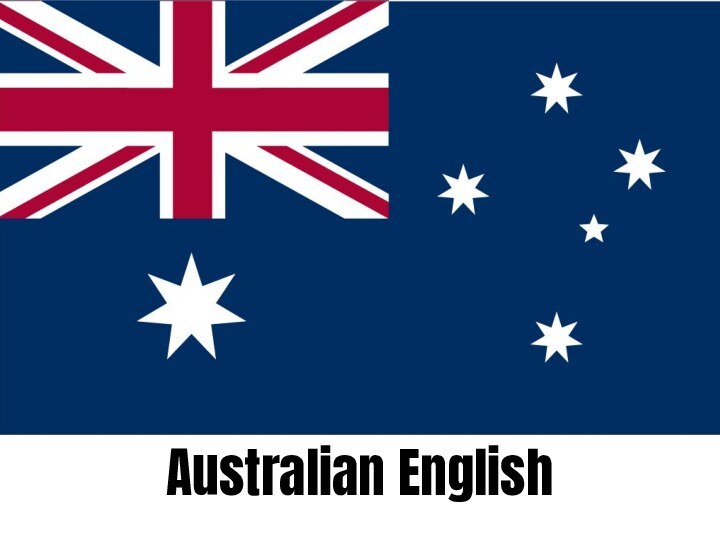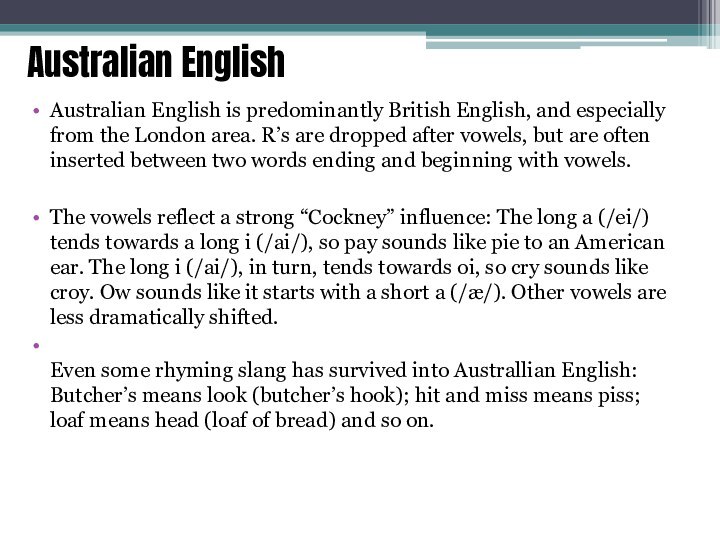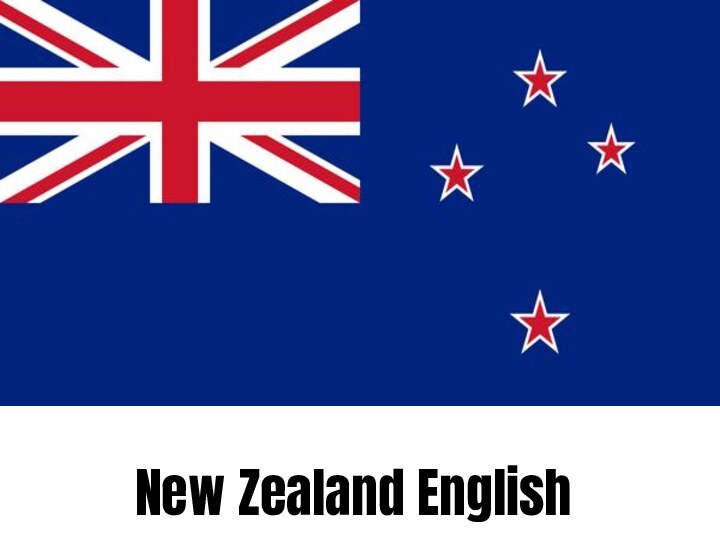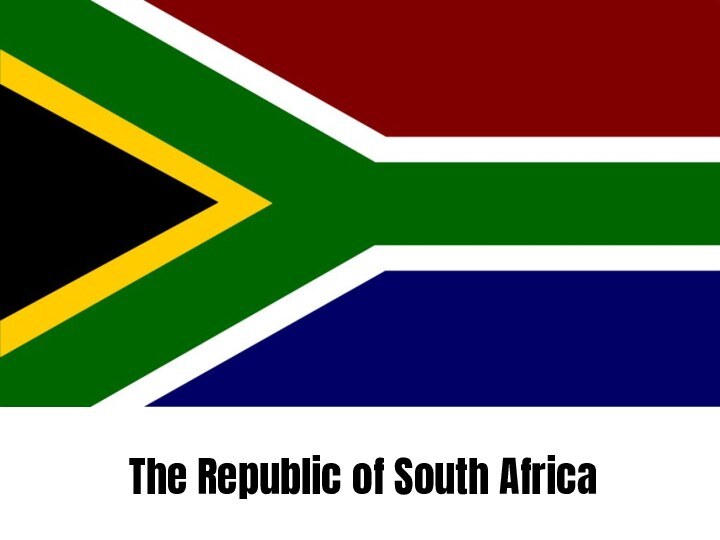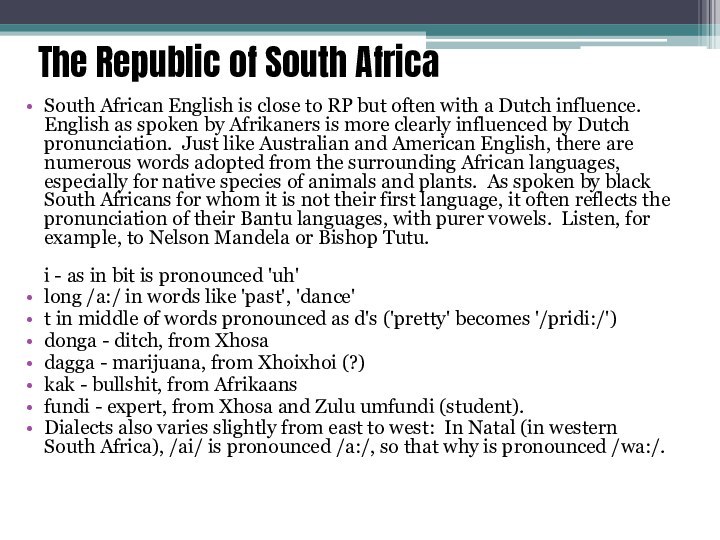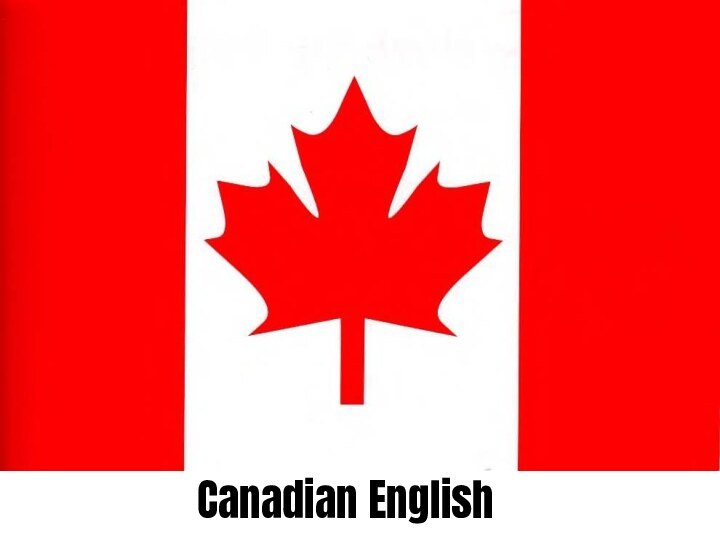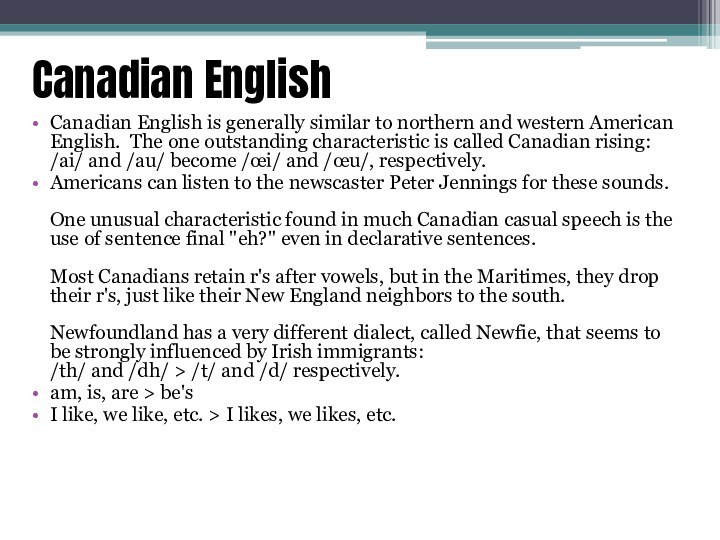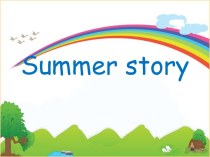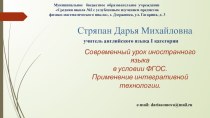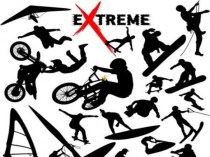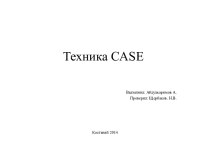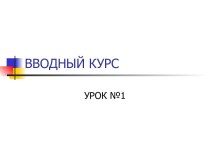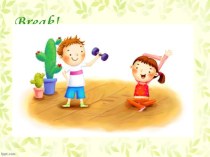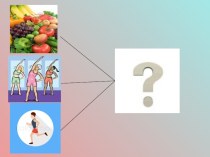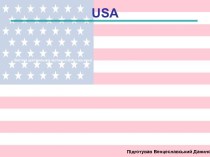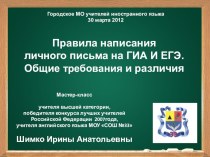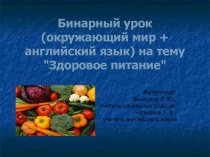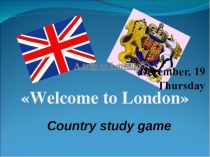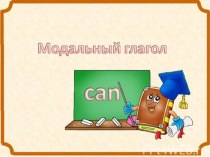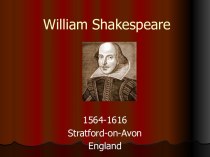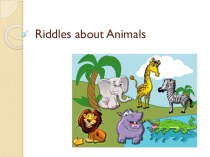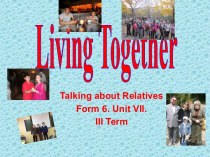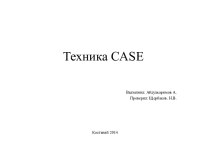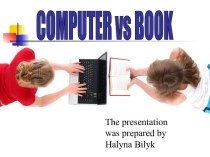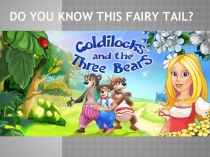Слайд 3
Countires with English as a first language
Слайд 5
American English
It has a number of regional accents
but
on the whole they share enough common
features
in pronunciation and speech
patterns so that the spoken language
in the USA can be clearly distinguished
from the language spoken in UK or from
other varieties of spoken English.
Common characteristics of regional
American accents include such features
as the sound [r] pronounced in all
positions in words (e.g., hard [ha:rd], more [mo:r], first [fərst]); the sound [æ] in words like "ask, last, class, demand, dance" (whereas British English has [a:] in such cases); the sound [o] that sounds like [a:] in words like "hot, off, rob, gone, sorry, bother, want"; the sound [yu:] pronounced as [u:] after the letters "d, n, s, t" (duplicate, news, sue, student, tune).
In writing the letter U is missed, e.g. our – or, colour – color.
Слайд 6
Standard English is closest to the "northern cities"
/æ:/ in find, mind/oi/ > /o/ in boil, oil/u:/ > /yu:/ in due, tuesday au/ > /æu/ in out, doubt/e/ > /ei/ in bed, head/e/ > /i/ in pen, tengreasy > greazy carry > totedragged > drugyou > you all, y’allSouthern: help, bulb, wolf > /hep/, /bœb/, /wuf/Southern vs south midland: drop r’s -- strong, sometimes retroflex, r’s wash: /wa:sh/ -- /wosh/, /worsh/think: /thingk/ -- /theingk/egg: /eg/ -- /eig/moon: /mu:n/ -- /mü:n/snake doctor -- snake feedersnap beans -- green beansgoobers -- peanutsNorthern (Massachussets, Connecticut, Vermont, New York, Michigan, Illinois, New York City area etc.) VS north midland (Pennsylvania, Ohio, Indiana, Illinois, Iowa, Missouri, Kansas etc.) : fog, hog: /fag/, /hag/ -- /fog/, /hog/ roof: /ruf/, /huf/ -- /ru:f/, /hu:f/ cow, house: /kau/, /haus/ -- /kæu/, /hæus/ wash: /wa:sh/ -- /wosh/, /worsh/ darning needle -- snake feeder pail -- bucket teeter-totter -- see-saw fire-fly -- lightning-bugEastern New England, Boston area, NYC area drop r’s insert transitional r’s, as in law’r’n awdah Eastern New England, Boston area, Virginia area /æ/ frequently becomes /a/, e.g. in aunt, dance, glassMary-marry-merry (/eir/-/ær/-/er/) distinctions preserved only in r-less areas, rapidly disappearing from American speechloss of voiceless w: which > /wic/loss of voiceless y: human > /yum'n/">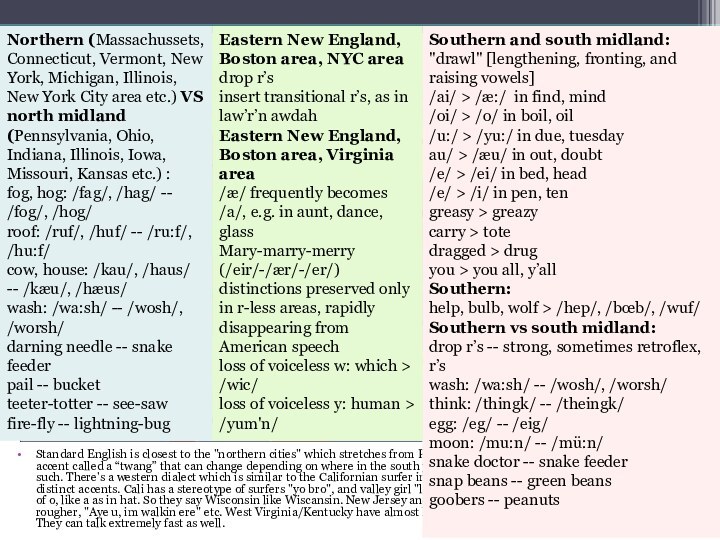
which stretches from Pennsylvania to Michigan. There's a southern
accent called a “twang” that can change depending on where in the south you are. Texas area has a “drawl”, lots of y'all's and such. There's a western dialect which is similar to the Californian surfer image of that area. Then there are also a lot of distinct accents. Cali has a stereotype of surfers "yo bro", and valley girl "like oh my gosh, totally". Wisconsin's use a instead of o, like a as in hat. So they say Wisconsin like Wiscansin. New Jersey and New York talk a lot faster and seemingly rougher, "Aye u, im walkin ere" etc. West Virginia/Kentucky have almost hillbilly accents. Louisiana has a Cajun accent. They can talk extremely fast as well.
Southern and south midland:
"drawl" [lengthening, fronting, and raising vowels]
/ai/ > /æ:/ in find, mind
/oi/ > /o/ in boil, oil
/u:/ > /yu:/ in due, tuesday
au/ > /æu/ in out, doubt
/e/ > /ei/ in bed, head
/e/ > /i/ in pen, ten
greasy > greazy
carry > tote
dragged > drug
you > you all, y’all
Southern:
help, bulb, wolf > /hep/, /bœb/, /wuf/
Southern vs south midland:
drop r’s -- strong, sometimes retroflex, r’s
wash: /wa:sh/ -- /wosh/, /worsh/
think: /thingk/ -- /theingk/
egg: /eg/ -- /eig/
moon: /mu:n/ -- /mü:n/
snake doctor -- snake feeder
snap beans -- green beans
goobers -- peanuts
Northern (Massachussets, Connecticut, Vermont, New York, Michigan, Illinois, New York City area etc.) VS north midland (Pennsylvania, Ohio, Indiana, Illinois, Iowa, Missouri, Kansas etc.) :
fog, hog: /fag/, /hag/ -- /fog/, /hog/
roof: /ruf/, /huf/ -- /ru:f/, /hu:f/
cow, house: /kau/, /haus/ -- /kæu/, /hæus/
wash: /wa:sh/ -- /wosh/, /worsh/
darning needle -- snake feeder
pail -- bucket
teeter-totter -- see-saw
fire-fly -- lightning-bug
Eastern New England, Boston area, NYC area
drop r’s
insert transitional r’s, as in law’r’n awdah
Eastern New England, Boston area, Virginia area
/æ/ frequently becomes /a/, e.g. in aunt, dance, glass
Mary-marry-merry (/eir/-/ær/-/er/) distinctions preserved only in r-less areas, rapidly disappearing from American speech
loss of voiceless w: which > /wic/
loss of voiceless y: human > /yum'n/
Слайд 8
The dialects in Great Britain
Слайд 9
The dialects in Great Britain
British accents include Received
Pronunciation, Cockney, Estuary, Midlands English, West Country, Northern England,
Welsh, Scottish, Irish, and many others.
Слайд 10
Southern
It includes r-dropping after vowels, unless followed by
another vowel. Instead, vowels are lengthened or have an
/'/ off-glide, so fire becomes /fai'/, far becomes /fa:/, and so on.
regular use of "broad a" (/a:/), where GA (General American) would use /æ/.
"long o" is pronounced /'u/, where GA uses /ou/.
final unstressed i is pronounced /i/, where GA uses /i:).
t between vowels retained as /t/ (or a glottal stop, in its variants), where GA changes it to /d/.
Слайд 11
Received Pronunciation (RP)
The English of well-bred Londoners, especially
graduates of the public schools (e.g. Eton and Harrow)
and "Oxbridge", was the origin of "the Queen's English," also known as RP, Received Standard, BBC English, Public school English normative English or "posh". RP is a Southern England accent, but it does not have any regional peculiarities. RP is close to standard English pronunciation as it is described in textbooks for learners of English as a 2d language and is traditionally taught to foreign learners of English.
Слайд 13
Cockney
The term Cockney traditionally refers to people
born within an area of London, that is covered
by "the sound of Bow bells“ of St Mary-le-Bow (a church). Also it’s the dialect of the working class of East End London. In late Middle English it denoted a spoilt child and in Middle English “cokeney” meant ‘cock's egg’, a small misshapen egg. A later sense was ‘a town-dweller regarded as affected or puny’, from which the current sense arose in the early 17th c.
Слайд 14
Cockney
initial h is dropped, so house becomes /aus/
(or even /a:s/).
/th/ and /dh/ become /f/ and /v/
respectively: think > /fingk/, brother > /brœv'/.
t between vowels becomes a glottal stop: water > /wo?'/.
diphthongs change, sometimes dramatically: time > /toim/, brave > /braiv/, etc.
Grammatical features:
Use of me instead of my, for example, "At's me book you got 'ere". Cannot be used when "my" is emphasised; e.g., "At's my book you got 'ere" (and not "his").
Use of ain't
Use of double negatives, for example "I ditn't see nuffink.“
Слайд 15
Cockney
Besides it includes a large number of
slang words, including the famous rhyming slang:
HAVE A BUTCHERS
- TAKE A LOOK
Слайд 16
Cockney
Besides it includes a large number of
slang words, including the famous rhyming slang:
NORTH AND SOUTH
- MOUTH
Слайд 17
Cockney
Besides it includes a large number of
slang words, including the famous rhyming slang:
SKIN AND BLISTER
- SISTER
Слайд 18
Cockney
Besides it includes a large number of
slang words, including the famous rhyming slang:
APPLES AND PEARS
- STAIRS
Слайд 19
Cockney
Besides it includes a large number of
slang words, including the famous rhyming slang:
RABBIT AND PORK
- TALK
Слайд 20
Estuary English
From London down the Thames a new
working and middle class dialect has evolved and it
rapidly becomes "the" southern dialect. It combines some characteristics of Cockney with RP, but makes much less use of Cockney slang. It’s popular especially among so-called 'chattering classes' (people like journalists, who talk a lot).
It is called Estuary English because many upwardly mobile professional people among whom it is fashionable live in the Docklands area of London by the river. It is also called Mockney because it is a fake form of Cockney English, without all the colourful language play.
Слайд 21
Estuary English
Generally, the grammar is unchanged but features
such as the 'glottal stop', where the letter T
is not pronounced in the middle of words such as 'bottle' (pronounced 'bo'all') are used.
Слайд 22
East Anglian
This dialect is similar to the
Southern, but keeps its h's:
t between vowels usually becomes
a glottal stop.
/ai/ becomes /oi/: time > /toim/.
RP yu becomes u: after n, t, d... as in American English.
the -s in the third person singular is usually dropped [e.g. he goes > he go, he didn't do it > he don't do it]
Слайд 23
East Midlands
The dialect of the East Midlands,
once filled with interesting variations from county to county,
is now predominantly RP. R's are dropped, but h's are pronounced. The only signs that differentiate it from RP:
ou > u: (so go becomes /gu:/).
RP yu; becomes u: after n, t, d... as in American English.
Слайд 24
The West Country
r's are not dropped.
initial s often
becomes z (singer > zinger).
initial f often becomes v
(finger > vinger).
vowels are lengthened.
Слайд 25
West Midlands
This is the dialect of Ozzie Osbourne!
While pronunciation is not that different from RP, some
of the vocabulary is:
are > am; am, are (with a continuous sense) > bin;
is not > ay; are not > bay.
Brummie is the version of West Midlands spoken in Birmingham.
Слайд 26
Lancashire
It is spoken north and east of Liverpool
and has the southern habit of dropping r's. Other
features:
/œ/ > /u/, as in luck (/luk/);
/ou/ > /oi/, as in hole (/hoil/).
Scouse is the very distinctive Liverpool accent, a version of the Lancashire dialect, that the Beatles made famous. Features:
the tongue is drawn back;
/th/ and /dh/ > /t/ and /d/ respectively.
final k sounds like the Arabic q.
for is pronounced to rhyme with fur.
Слайд 27
Yorkshire
The Yorkshire dialect is known for its sing-song
quality, a little like Swedish.
/œ/ > /u/, as in
luck (/luk/).
the is reduced to t'.
initial h is dropped.
was > were.
still use thou (pronounced /tha/) and thee.
aught and naught (pronounced /aut/ or /out/ and /naut/ or /nout/) are used for anything and nothing.
Слайд 28
Northern
The Northern dialect closely resembles the southern-most Scottish
dialects. It retains many old Scandinavian words, such as
bairn for child, and not only keeps its r's, but often rolls them. The most outstanding version is Geordie, the dialect of the Newcastle area.
-er > /æ/, so father > /fædhæ/.
/ou/ > /o:'/, so that boat sounds like each letter is pronounced.
talk > /ta:k/
work > /work/
book > /bu:k/
my > me
me > us
our > wor
you plural > youse
Слайд 29
Wales
Welsh English is characterized by a sing-song quality
and lightly rolled r's. It has been strongly influenced
by the Welsh language, although it is increasingly influenced today by standard English, due to the large number of English people vacationing and retiring there.
“ing” is [in]; [h] is present; “wood” in Eng has [u], in WE may have both [u] and [a]
Слайд 30
Scotland
There are several "layers" of Scottish English. Most
people today speak standard English with little more than
the changes just mentioned, plus a few particular words that they themselves view as normal English, such as to jag (to prick) and burn (brook). In rural areas, many older words and grammatical forms, as well as further phonetic variations, still survive, but are being rapidly replaced with more standard forms. But when a Scotsman (or woman) wants to show his pride in his heritage, he may resort to quite a few traditional variations in his speech. There are also several urban dialects, particularly in Glasgow and Edinburgh. In the Highlands, especially the Western Islands, English is often people's second language, the first being Scottish Gaelic. Highland English is pronounced in a lilting fashion with pure vowels.
Слайд 31
Scotland
Scottish English uses a number of special dialect
words. For example lake – loch; mountain – ben;
church – kirk; to remember – to mind; beautiful – bonny; to live – to stay; a girl – lassie; no – ken
/oi/, /ai/, and final /ei/ > /'i/, e.g. oil, wife, tide...
final /ai/ > /i/, e.g. ee (eye), dee (die), lee (lie)...
/ou/ > /ei/, e.g. ake (oak), bate (boat), hame (home), stane (stone), gae (go)...
/au/ > /u:/, e.g. about, house, cow, now... (often spelled oo or u)
/o/ > /a:/, e.g. saut (salt), law, aw (all)...
/ou/ > /a:/, e.g. auld (old), cauld (cold), snaw (snow)...
/æ/ > /a/, e.g. man, lad, sat...
also: pronounce the ch's and gh's that are silent in standard English as /kh/: nicht, licht, loch...
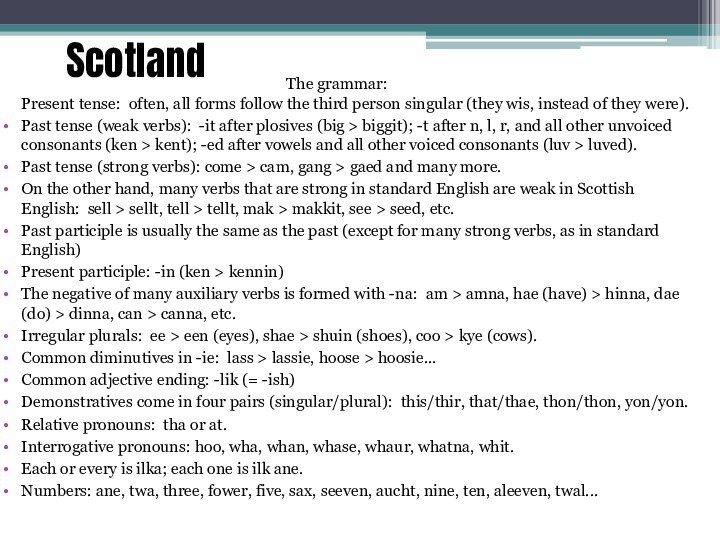
The grammar:
Present tense: often, all forms follow the third person singular (they wis, instead of they were).
Past tense (weak verbs): -it after plosives (big > biggit); -t after n, l, r, and all other unvoiced consonants (ken > kent); -ed after vowels and all other voiced consonants (luv > luved).
Past tense (strong verbs): come > cam, gang > gaed and many more.
On the other hand, many verbs that are strong in standard English are weak in Scottish English: sell > sellt, tell > tellt, mak > makkit, see > seed, etc.
Past participle is usually the same as the past (except for many strong verbs, as in standard English)
Present participle: -in (ken > kennin)
The negative of many auxiliary verbs is formed with -na: am > amna, hae (have) > hinna, dae (do) > dinna, can > canna, etc.
Irregular plurals: ee > een (eyes), shae > shuin (shoes), coo > kye (cows).
Common diminutives in -ie: lass > lassie, hoose > hoosie...
Common adjective ending: -lik (= -ish)
Demonstratives come in four pairs (singular/plural): this/thir, that/thae, thon/thon, yon/yon.
Relative pronouns: tha or at.
Interrogative pronouns: hoo, wha, whan, whase, whaur, whatna, whit.
Each or every is ilka; each one is ilk ane.
Numbers: ane, twa, three, fower, five, sax, seeven, aucht, nine, ten, aleeven, twal...
Слайд 33
Ireland
Irish English is strongly influenced by Irish Gaelic:
r
after vowels is retained
"pure" vowels (/e:/ rather than /ei/,
/o:/ rather than /ou/)
/th/ and /dh/ > /t/ and /d/ respectively.
The sentence structure of Irish English often borrows from the Gaelic:
Use of be or do in place of usually:
I do write... (I usually write)
Use of after for the progressive perfect and pluperfect:
I was after getting married (I had just gotten married)
Use of progressive beyond what is possible in standard English:
I was thinking it was in the drawer
Use of the present or past for perfect and pluperfect:
She’s dead these ten years (she has been dead...)
Use of let you be and don’t be as the imperative:
Don’t be troubling yourself
Use of it is and it was at the beginning of a sentence:
it was John has the good looks in the family
Is it marrying her you want?
Substitute and for when or as:
It only struck me and you going out of the door
Substitute the infinitive verb for that or if:
Imagine such a thing to be seen here!
Drop if, that, or whether:
Tell me did you see them
Statements phrased as rhetorical questions:
Isn’t he the fine-looking fellow?
Extra uses of the definite article:
He was sick with the jaundice
Unusual use of prepositions:
Sure there’s no daylight in it at all now
As with the English of the Scottish Highlands, the English of the west coast of Ireland, where Gaelic is still spoken, is lilting, with pure vowels.
Слайд 36
Australian English
Australian English is predominantly British English, and
especially from the London area. R’s are dropped after
vowels, but are often inserted between two words ending and beginning with vowels.
The vowels reflect a strong “Cockney” influence: The long a (/ei/) tends towards a long i (/ai/), so pay sounds like pie to an American ear. The long i (/ai/), in turn, tends towards oi, so cry sounds like croy. Ow sounds like it starts with a short a (/æ/). Other vowels are less dramatically shifted.
Even some rhyming slang has survived into Australlian English: Butcher’s means look (butcher’s hook); hit and miss means piss; loaf means head (loaf of bread) and so on.
Слайд 37
Like American English has absorbed numerous American Indian

words, Australian English has absorbed many Aboriginal words:
nulla-nulla --
a club
wallaby -- small kangaroo
wombat -- a small marsupial
woomera -- a weapon
wurley -- a simple shelter
...not to mention such ubiquitous words as kangaroo, boomerang, and koala!
Colorful expressions also abound:
Like a greasespot -- hot and sweaty
Like a stunned mullet -- in a daze
Like a dog’s breakfast -- a mess
Up a gumtree -- in trouble
Mad as a gumtree full of galahs -- insane
Happy as a bastard on Fathers’ Day -- very happy
Dry as a dead dingo’s donger -- very dry indeed
Another characteristic of Australian English is abbreviated words, often ending in -y, -ie, or -o:
aussie -- Australian
chalky -- teacher
chewie -- chewing gum
chockie -- chocoloate
footy -- football
frostie -- a cold beer
lavvy -- lavatory
lippie -- lipstick
lollies -- sweets
mossie -- mosquito
mushies -- mushrooms
oldies -- one’s parents
rellies -- one’s relatives
sammie -- sandwich
sickie -- sick day
smoko -- cigarette break
sunnies – sunglasses
Слайд 39
New Zealand English
New Zealand English is heard by
Americans as "Ozzie Light." The characteristics of Australian English
are there to some degree, but not as intensely. The effect for Americans is uncertainty as to whether the person is from England or Australia. One clue is that New Zealand English sounds "flatter" (less modulated) than either Australian or British English and more like western American English.
Слайд 41
The Republic of South Africa
South African English is
close to RP but often with a Dutch influence.
English as spoken by Afrikaners is more clearly influenced by Dutch pronunciation. Just like Australian and American English, there are numerous words adopted from the surrounding African languages, especially for native species of animals and plants. As spoken by black South Africans for whom it is not their first language, it often reflects the pronunciation of their Bantu languages, with purer vowels. Listen, for example, to Nelson Mandela or Bishop Tutu.
i - as in bit is pronounced 'uh'
long /a:/ in words like 'past', 'dance'
t in middle of words pronounced as d's ('pretty' becomes '/pridi:/')
donga - ditch, from Xhosa
dagga - marijuana, from Xhoixhoi (?)
kak - bullshit, from Afrikaans
fundi - expert, from Xhosa and Zulu umfundi (student).
Dialects also varies slightly from east to west: In Natal (in western South Africa), /ai/ is pronounced /a:/, so that why is pronounced /wa:/.
Слайд 43
Canadian English
Canadian English is generally similar to northern
and western American English. The one outstanding characteristic is
called Canadian rising:
/ai/ and /au/ become /œi/ and /œu/, respectively.
Americans can listen to the newscaster Peter Jennings for these sounds.
One unusual characteristic found in much Canadian casual speech is the use of sentence final "eh?" even in declarative sentences.
Most Canadians retain r's after vowels, but in the Maritimes, they drop their r's, just like their New England neighbors to the south.
Newfoundland has a very different dialect, called Newfie, that seems to be strongly influenced by Irish immigrants:
/th/ and /dh/ > /t/ and /d/ respectively.
am, is, are > be's
I like, we like, etc. > I likes, we likes, etc.
